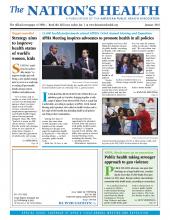Reducing the stigma surrounding mental health is not solely the responsibility of psychologists and social workers. It takes a team effort.
A team approach is what health and community leaders in Philadelphia realized they needed when the city’s Mental Health First Aid program was launched in 2012.
A concept that originated in Australia and was introduced in the U.S. in 2008, Mental Health First Aid offers training for residents on how to see warning signs of a crisis and equips them with knowledge on how people can seek help. There are targeted trainings for adults, youth, public safety and veterans, said Félice Lê-Scherban, PhD, MPH, an assistant professor at Drexel University’s Dornsife School of Public Health, during a Monday, Nov. 2, session on the program at APHA’s 143rd Annual Meeting and Exposition. Amy Carroll-Scott, PhD, MPH, a member of the Community Health Planning and Policy Development Section, is leading Drexel’s effort to evaluate the first aid program run under Philadelphia’s Department of Behavioral Health and Intellectual Disability Services.
There are Mental Health First Aid instructors in all 50 states and the program is coordinated nationally via the National Council for Behavioral Health, Maryland Department of Health and Mental Hygiene and Missouri Department of Mental Health, said Lê-Scherban, an APHA member. APHA has offered the training to its staff.
The eight-hour-long training session asks trainees to take five steps when approaching a mental health-related emergency: Assess a person for their risk of harming themselves or committing suicide, listen without judgment, give reassurance and information, encourage appropriate professional help and encourage self-help and other support strategies.
As of November, more than 11,500 people in Philadelphia had received Mental Health First Aid training, said Arthur Evans, PhD, commissioner of the city of Philadelphia’s Department of Behavioral Health and Intellectual Disability Services.
Mental Health First Aid public safety training is required for city of Philadelphia police cadets and new prison correctional officers, according to Evans.
Evans said it is important to move to population health strategies such as Mental Health First Aid because “our method of only treating people who are ill is going to bankrupt us.”
“We got a really good response to this and it’s been one of the most important things I’ve seen in terms of reducing stigma and changing perception,” Evans said.
For more information about the Philadelphia program, visit http://healthymindsphilly.org/mhfa. For more information about Mental Health First Aid, visit www.mentalhealthfirstaid.org.
- Copyright The Nation’s Health, American Public Health Association









